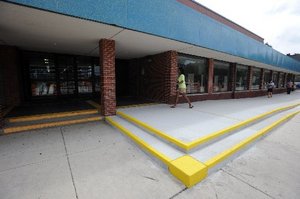Related article: Ann Arbor downtown library bond proposal defeated: What now?
Voters sent a clear message to the leadership of the Ann Arbor District Library this week: This community is not willing to provide an open checkbook for a monumental downtown library.
It would be folly to imagine that advocates failed to convey the intent or the message, and that given another go, the results will be different. The message was clearly conveyed and clearly rejected.

Lon Horwedel | AnnArbor.com
The 'day-after¹ headline on AnnArbor.com asked "What now?" I have a few possible answers, or more accurately, some more specific questions:
First, let's step back as a community and ask ourselves what we want our library system to look like in 10 years, or in 25. What are the core principles that drive our vision for the system? Are those core principles best served via expanding investments in buildings, collections, technology, staff, or in other ways? What is the ideal model for our library system over the long term?
I don¹t pretend to have answers for those questions, and I¹d suggest that the members of the Ann Arbor District Library Board be open to rethinking their own predispositions as well.
Second, then, let¹s bring fresh voices to the conversation. Is there an opportunity to tap the resources available via a premier set of academics in the University of Michigan¹s School of Information? What evidence-based suggestions might they make about the relationship between a community and its library resources?
Might it be that decentralization of information dissemination becomes a part of that model? If we were to suggest that access to information and educational resources were a part of the first question, that is, a part of the mission of the library system, might it make sense to look at how we can best place information at the fingertips of users?
The next question -- which can only follow from the previous, not precede it -- is about the infrastructure of our library system. Few will seriously argue that the current downtown facility is perfect, or that the West branch is anywhere near adequate. At the same time, we cannot claim to have good geographical distribution of library resources equally available to all users throughout the district. Residents at the perimeters of the district do not have the ability to walk or bicycle to a library. Does that matter?
Would an Amazon.com model of a virtual system, with a central warehouse and efficient distribution of information in a variety of physical and electronic media turn out to be the way forward? Are physical meeting spaces, be they downtown or elsewhere, most critical? Would a reintegration of school libraries and branch libraries work? Is there an opportunity for synthesis between the university collections and the district resources?
Another way to think the challenge starts with money. We all recognize that having a top-notch library system costs money, but this becomes the sticky wicket: we are fortunate to live in a community that is willing to commit substantial public money to a great library system and enjoys the benefit of that system. That said, the community does not have bottomless pockets, which means that there are choices to be made.
Start, as an example, with the current downtown facility. If starting from scratch is off the table altogether, and the budget for improvements to that facility was limited to, say $6.5 million, how would you choose to approach the problem? (If your reflex is, "That¹s impossible, it must be knocked down," please stop and start over at the top of this letter.) What are the highest priorities?
More broadly, what if an anonymous donor wrote an unrestricted gift to the district system tomorrow for, say $15 million? How would you spend it? On facilities, additional staff, more technology? Please remember, the answer to this question follows from the previous questions, and that the most important part of the question is not the amount, but how you order priorities, given any limited sum to spend.
Take the principles on which we collectively gain consensus, and the creative input from some fresh voices, acknowledge the realities of funding limitations, and let us know what you learn. The result might well be that we look back on the defeat of the bond proposal this year as a great blessing, because it allows the growth of the system in ways previously unimagined.
Please consider the recent bond proposal rejection as an opportunity. Seeing it as a defeat, and limiting your response to conjuring a variation of the same pitch in another year or two, would be a grave disservice to the community.
We treasure our library. Let¹s use the opportunity provided by the attention to our library system as a way to maintain and enhance the greatness of the library as a whole, not just as a monument in the city¹s skyline.
(This article was submitted by Glenn Gottfried of Ann Arbor.)